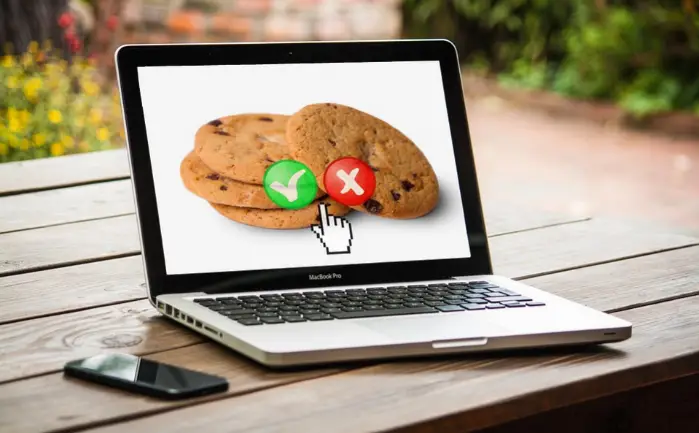We recently had a reader asking us this question – Should Cookies be Enabled or Disabled in my Browser? Now, you might have seen a message displayed on the computer screen that asks you to accept the cookies on a particular website. Today, almost all websites use cookies. Cookies are the trackers that collect users’ data to provide them with a more accurate and smoother internet browsing experience.
Cookies are of two types mainly:
- First-party cookies
- Third-party cookies

Users can enable and disable the cookies on the web browser they use. The question is, what happens when you enable or disable the cookies? Should you enable or disable the cookies in your web browser? This article will let you know whether you should enable or disable cookies in your web browser.
Every web browser has an option to delete or disable the cookies. You can either turn off or block the cookies or delete them. Deleting all the cookies data on your browser means erasing all the saved information on your browser, like website preferences, account information, etc. Deleting all the cookie data is beneficial when you are using a shared computer. However, disabling or deleting cookies has its own advantages and disadvantages.
For most users letting the browser be at its default settings should be good enough, though!
Read: What is Cookie Stealing or Scraping?
Advantages of Enabling and Disabling Browser Cookies
1] Convenience is the most significant advantage of enabling cookies. Cookies track users’ data when surfing the internet and provide them with the benefit of pre-filled information. For example, when you log into an account like Facebook for the first time, you must enter a username and password. However, when you revisit Facebook, it will show your profile username. Now, you simply have to click on it and enter your password. This is how cookies make web browsing convenient. Websites also track your location in order to serve you better based on the most relevant information in your area. However, you can disable your geolocation.
2] Another significant benefit that cookies provide is personalization. Have you ever wondered how YouTube shows you videos of your interest? How do Amazon and other eCommerce websites show you the products of your taste? These websites use cookies to track users’ behavior. It is an indirect method of increasing watch time on YouTube and chances of sales on eCommerce platforms.
Read: How to opt-out of Data Tracking & Targetted ads on the Internet.
3] Websites also use cookies to show users the most relevant ads, which force them to click. This benefits both businesses and consumers, as businesses get revenue and consumers get their desired product or service.
4] Enabling cookies is the only way that lets websites know the users’ choices so that they can tailor their services and products to enhance the users’ experience.
5] Your login information is stored so that you do not have to log in every time you visit the site. You get logged in automatically.
Read: Block or Allow Third-Party Cookies.
6] You can protect your privacy by deleting or disabling cookies. If you disable the cookies, the websites that use and store your data via cookies will no longer be able to do so. Apart from this, you can also save your information like saved login usernames, filled forms, etc., from another person on the same device.
7] Website hosts cannot know how often you visit their pages without your cookie data. Also, the websites will not be able to prepare your digital persona based on your tracked data.
8] You will start a new session when you delete cookie data on your web browser. Hence, you will see fewer targeted ads.
Read: How to protect Personally Identifiable Information.
Disadvantages of Enabling or Disabling Cookies
1] The biggest problem that users have with the cookies is regarding their privacy. They feel that they have to compromise with their privacy if they use cookies. Due to this, some users clear cookies and other data from the web browsers every time they exit.
So, is it really true? Do cookies invade users’ privacy? Cookies allow websites to collect a lot of users’ data, which can become a threat to users because anyone can access it.
2] Cookies that allow personalization also come with some risks. Some software has security issues that allow third parties to access the users’ name, address, and credit card information (if stored in the browser).
3] You will have to log in, again and again, every time you visit the webs service.
Read: How much are you worth online to companies like Google & Facebook?
4] Disabling the cookies makes your web browsing less convenient. When you clear all your cookie data, your web browser won’t be able to remember your site preferences.
5] Disabling or clearing the cookie data will delete your login information and suggestions. Hence, you have to re-enter the information again.
6] Clearing cookies does not eliminate data tracking. Many websites can reconstruct cookies unless you clear all browsing history and cache data. Even then, your data is still at risk due to active fingerprint trackers. If you want, you can also disable browser fingerprinting.
Read: What is Web Tracking?
You have seen the pros and cons of enabling and disabling the browser cookies. If you disable all the cookies, you may face browsing issues. On the other hand, enabling cookies can create a privacy issue. Therefore, we suggest you manage cookies wisely.
Read next: Don’t let advertising networks track you.